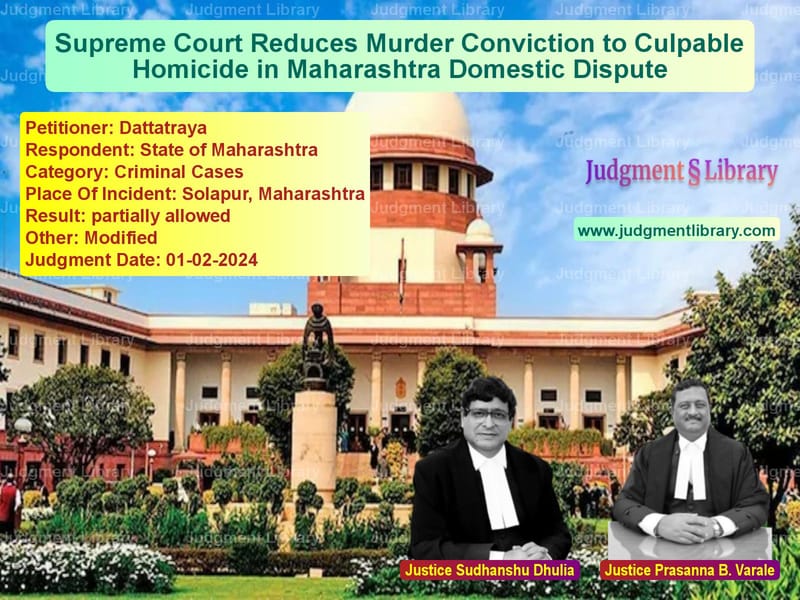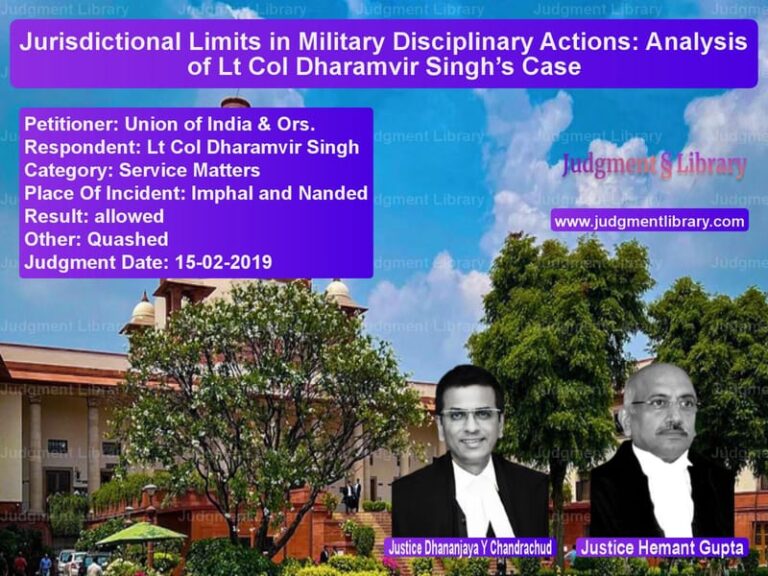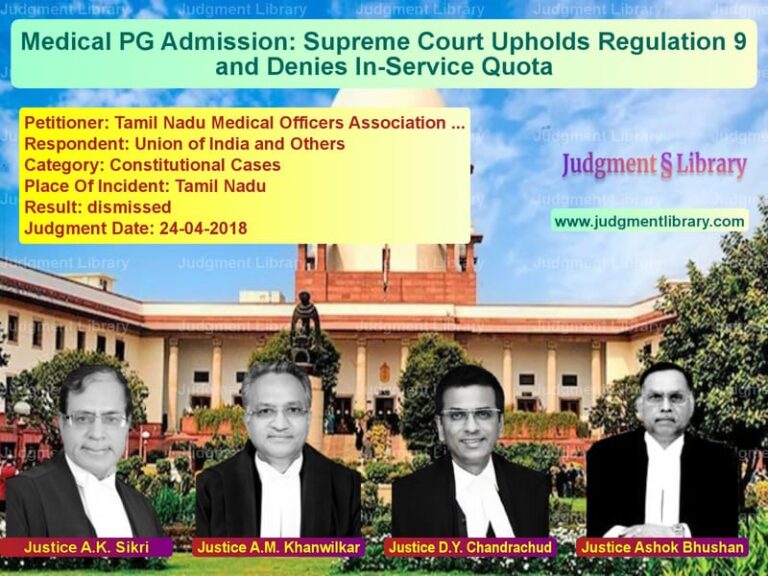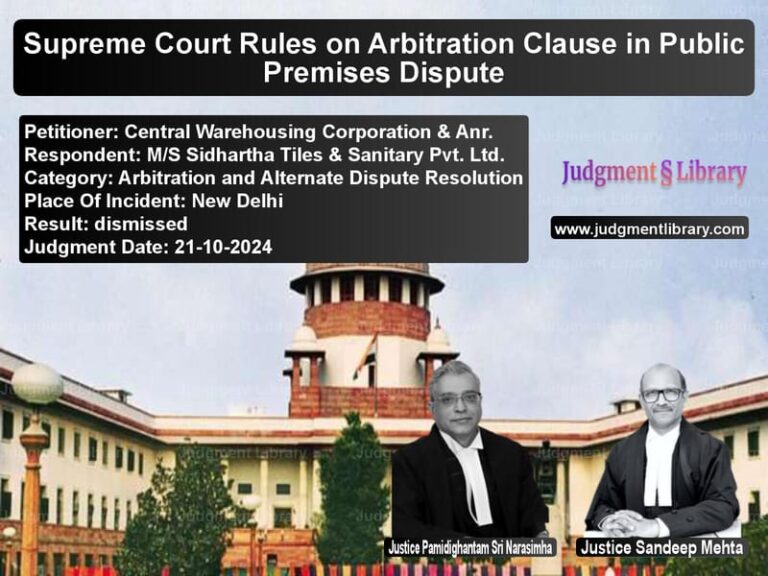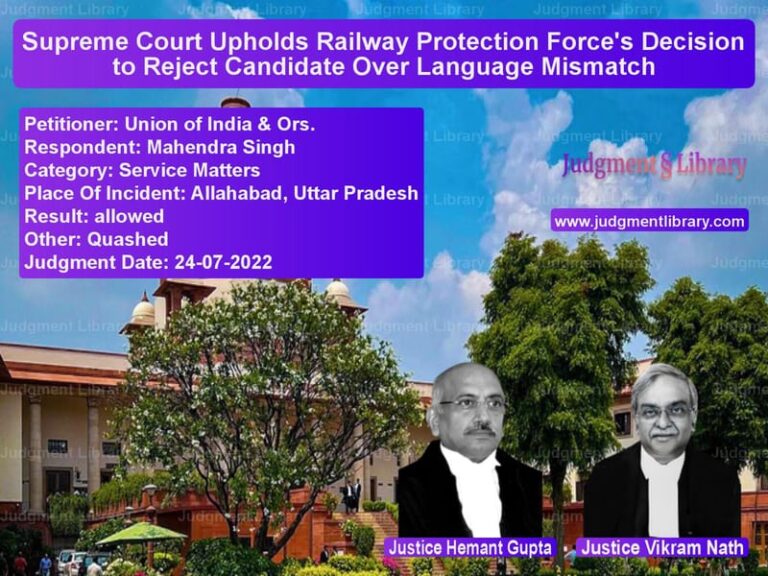Supreme Court Reduces Murder Conviction to Culpable Homicide in Maharashtra Domestic Dispute
The Supreme Court of India has delivered a significant judgment in a case concerning the death of a pregnant woman, Meenabai Dattatraya Gawali, in Maharashtra. The Court ruled that the accused, her husband Dattatraya, was guilty of culpable homicide not amounting to murder, reducing his conviction from Section 302 to Section 304 Part II of the Indian Penal Code (IPC). The decision acknowledges that the act occurred in a sudden fight, without premeditation.
Background of the Case
The case dates back to January 26, 2007, when the appellant, Dattatraya, allegedly poured kerosene on his wife Meenabai, who was nine months pregnant, while she was cooking food. This resulted in a fire, leading to 98% burn injuries on the victim. She was immediately taken to the Civil Hospital in Solapur, where she gave a dying declaration stating that her husband, in an inebriated state, poured kerosene on her after an argument. She also mentioned that he attempted to douse the fire but was himself burned in the process.
Meenabai gave birth to a stillborn child on January 28, 2007, and succumbed to her injuries on February 4, 2007. The case, initially registered under Section 307 IPC (attempt to murder), was later amended to include Sections 302 (murder) and 316 (causing the death of an unborn child by an act amounting to culpable homicide).
Trial and High Court Proceedings
The trial court found Dattatraya guilty under Sections 302 and 316 IPC and sentenced him to life imprisonment for murder and ten years of rigorous imprisonment for causing the death of the unborn child. The Bombay High Court upheld this judgment, following which the accused approached the Supreme Court.
Arguments by the Petitioner
The petitioner’s counsel argued that:
- The act was not premeditated but happened in a sudden fight between the husband and wife.
- The deceased’s dying declaration confirmed that the accused attempted to extinguish the fire, indicating no intent to kill.
- There was no evidence of deliberate planning to kill his wife.
- The act falls under the exceptions to Section 300 IPC, making it culpable homicide not amounting to murder.
Arguments by the Respondent
The prosecution argued that:
- The dying declaration clearly pointed to the accused pouring kerosene on his wife and setting her on fire.
- Meenabai had previously faced domestic abuse due to her husband’s alcoholism and extramarital affairs.
- The accused was fully aware that his act could lead to death, which justifies a conviction under Section 302 IPC.
- The courts below had rightly convicted him, and there was no need for any leniency.
Supreme Court’s Observations
The Supreme Court closely examined the facts and circumstances of the case. It noted that:
- The quarrel between the husband and wife was spontaneous and not pre-planned.
- The accused did not intend to kill his wife but acted impulsively in a fit of anger.
- The accused’s attempt to douse the fire showed that he did not have a premeditated intent to cause death.
- While his actions led to the tragic death of his wife and unborn child, they fell under Exception 4 of Section 300 IPC, which deals with culpable homicide not amounting to murder when an act is committed in a sudden fight in the heat of passion.
The Court referred to the precedent set in Kalu Ram v. State of Rajasthan (2000) 10 SCC 324, where a similar situation resulted in the conviction being reduced to Section 304 Part II IPC.
Final Judgment and Sentence
Based on these observations, the Supreme Court modified the conviction as follows:
- The conviction under Section 302 IPC was altered to Section 304 Part II IPC.
- The accused was sentenced to ten years of rigorous imprisonment instead of life imprisonment.
- Since Dattatraya had already served more than ten years in jail, the Court ordered his immediate release unless required in another case.
Legal Implications of the Judgment
The judgment reinforces several key legal principles:
- Importance of Dying Declarations: The case highlights how dying declarations play a crucial role in determining the circumstances of a crime.
- Application of Exception 4 to Section 300 IPC: The Court’s decision clarifies when an act of killing may not amount to murder if it occurs in a sudden fight without premeditation.
- Judicial Discretion in Sentencing: The ruling shows that courts must differentiate between intentional murder and unintentional homicide when deciding on punishment.
Conclusion
The Supreme Court’s decision in this case balances justice with legal principles by ensuring that while the accused is held responsible for his actions, he is not punished beyond what is warranted under the law. This case serves as a significant precedent in determining the appropriate punishment for cases where domestic disputes escalate into tragic incidents.
Petitioner Name: Dattatraya.Respondent Name: State of Maharashtra.Judgment By: Justice Sudhanshu Dhulia, Justice Prasanna B. Varale.Place Of Incident: Solapur, Maharashtra.Judgment Date: 01-02-2024.
Don’t miss out on the full details! Download the complete judgment in PDF format below and gain valuable insights instantly!
Download Judgment: dattatraya-vs-state-of-maharashtra-supreme-court-of-india-judgment-dated-01-02-2024.pdf
Directly Download Judgment: Directly download this Judgment
See all petitions in Murder Cases
See all petitions in Suicide Cases
See all petitions in Domestic Violence
See all petitions in Judgment by Sudhanshu Dhulia
See all petitions in Judgment by Prasanna Bhalachandra Varale
See all petitions in partially allowed
See all petitions in Modified
See all petitions in supreme court of India judgments February 2024
See all petitions in 2024 judgments
See all posts in Criminal Cases Category
See all allowed petitions in Criminal Cases Category
See all Dismissed petitions in Criminal Cases Category
See all partially allowed petitions in Criminal Cases Category

